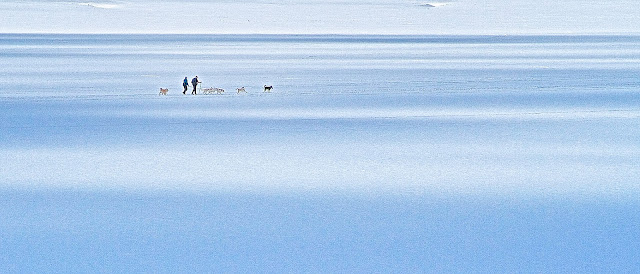Back in the old days when there were no streetlamps
we played outside after school under a bright moon.
We were just kids then and we did not consider it dark
we did not know that anyone else had the sun
while we had just the day-moon.
Does not everyone everywhere share the same moon?
On the playground and all through the village when a bitter wind blew
we did not consider it too cold or too windy or too this or too that
how the rivers froze and how the earth turned cold did not matter to us.
Often our sun was cold like a penny hiding behind the moon but
we did not consider it bad.

The earth glistened in the pitch black night
the sky hollowed in the clear light day
and our vision spread far off, away.
As a man, I read about
a place so still you could hear wax melting
down a lit candle.
They must have been talking about
my village, where on the coldest nights
the silence is so deep and vacant
each breath stands still as fractured stars.
How this poem originated: Eklutna Lake is the largest lake in Chugach State Park and provides the water for the city of Anchorage. The above picture of the lake was taken last April, before break-up. Eklutna is a native village (near my hometown of Eagle River), population 70. First settled more than 800 years ago, Eklutna is a Dena’ina Athabascan village, the oldest inhabited location in our area.
I got to thinking about the darkness that descends upon us now, come winter, and how the villages above the Arctic Circle exist in the extreme weather. I remembered the date Nov. 27, clearly now, because I was an itinerant therapist working in the hospital in Barrow, and on that day, many employees went to the windows and doors to take a “last look.” This would be the last day they would see the sun until the end of February.
The sun rides low now. I live in a valley, with mountains arching up on three sides. The sun peeks through notches, but in Dec. and Jan. the sun will be too low to clear the notches. It is then we leave town and go tropical.




This is so beautiful. My favorite line: we did not know that anyone else had the sun
Thank you for taking a peek, Kelly1
Beautiful, Monica. What is normal for us is an oddity for others. I lose the sun from mid-Nov. to Valentine's Day, but it shines so brightly on the mountain across from me that it's sunglasses light.
My moon (notice the possessiveness) had been exquisite these past few nights. It awes me to think that it's the same as yours, so breathtaking in these photos. The images of the day moon and the stillness conveyed via melting wax and fractured stars are very striking in this wonderful poem
"As a man" … & being reminded by this of the dark & cold Alaska winters, I recall the natural flow and warmth of skiing by the full moon … and of why winter escapes to Hawaii or Mexico were sometimes necessary for survival.
Yes, and when the darkness descends we go to more poetry readings and house concerts which keeps the internal flame glowing. Are you in Fairbanks, Gullible?
No, she's mine!! The moon, that is. At the least she was placed in the sky just for us women. Thank you, Deborah.
Yes, I remember skiing at 10 below under a clear moon at Circle Hot Springs…like pink pricks on your face; then a jump into the hot, steaming OUTDOOR pool. Ah. exquisite.
And isn't it strange that here, in the midst of the humidity and heat, we long first for autumn and then for cold, and when the snow comes (as it does now and then, or more likely ice) we become children again, remembering the smell of snow and being tucked in on those long, dark nights.
I love this line: "we did not consider it too cold or too windy or too this or too that"
So many people here seem somehow offended by the weather, as though perfection were their right.
ah yes, and then we go from air conditioned cars to air conditioned buildings and refuse to rub shoulders with the weather. One can take a hike at 20 below…you just have to dress for it.
The line also suggests the Buddhist way of accepting things as they are, without so much preference as to cause dissatisfaction.
This so well captures the crisp, clear wonder of a winter night, although the effect is diffused by too many of those street and house lights. I agree with shoreacres last sentence. I'm surprised, even though it's the norm, whenever people complain about the rain during a drought or the snow when the lack of it will damage trees and plants. Is a sunny day the only thing some people can appreciate? I'm glad for the people who see more, as you've expressed here.
When you're in a climate that includes 4 distinct seasons, you learn to appreciate them all…along with an ounce or two of complaint: Today freezing rain has closed down businesses, the university, and the entire Kenai Peninsula is without power right now. I'm staying home!